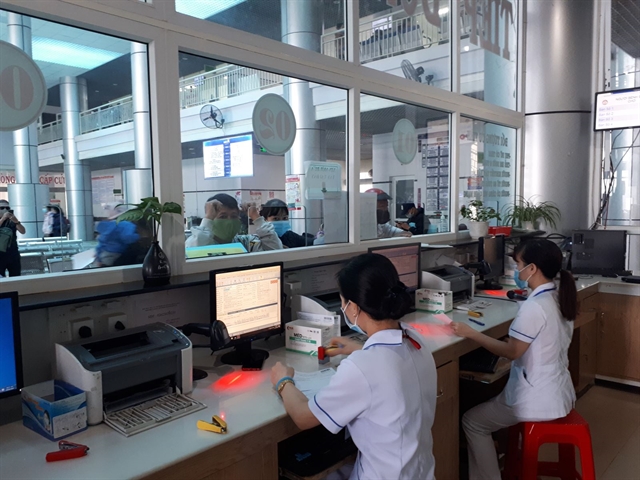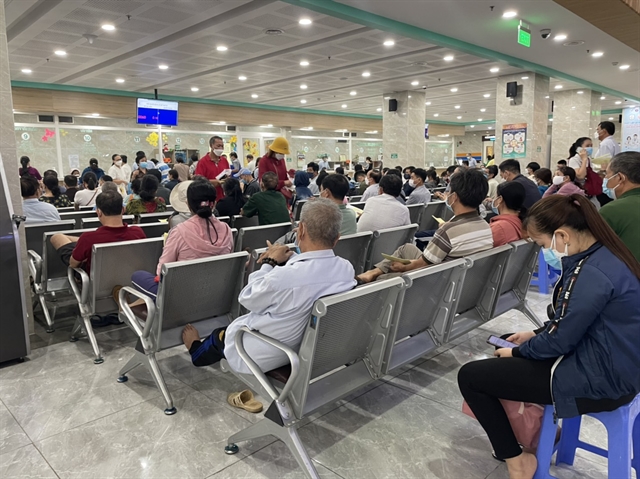 Society
Society

Officials at Việt Nam Social Insurance (VNSI) pointed out cases where individuals sought medical consultations and treatments from dozens to hundreds of times within a year.

|
| People complete payment procedures for medical expenses using health insurance cards. VNA/VNS Photo Xuân Minh |
By Chu Thanh Vân
HÀ NỘI — Officials at Việt Nam Social Insurance (VNSI) have emphasised the need for robust measures to curb the frequent and increasingly sophisticated misuse of health insurance funds, which has resulted in excessive spending affecting cardholders.
VNSI has suggested that amending healthcare insurance laws to establish a co-payment system and leveraging technology for monitoring and controlling fraudulent activities are crucial solutions.
Dương Đức Tuấn, director of the VNSI’s Centre for Health Insurance Appraisal and Multi-level Payments said the centre has identified cases of fraud through appraisal work, such as performing a complete organ removal surgery twice on the same patient, undergoing two cataract surgeries on the same eye in a short period and using the insurance cards of deceased persons or borrowing cards from others for medical consultations and treatment.
"We have reported to the Prime Minister and the Ministry of Health regarding cases of borrowing health insurance cards," he said.
"There are many comical situations where one person lends their card to another, and not just one but two people end up using it for medical visits, resulting in double claims for the same procedures."
Đức added that healthcare facilities should thoroughly verify information and cross-check personal data with health insurance card information. However, this was often overlooked in these cases.
He also pointed out cases where individuals sought medical consultations and treatments from dozens to hundreds of times within a year.
Appraisal work conducted in 2021 revealed that 1,289 people had sought medical check-ups and treatments more than 100 times, 8,024 people had sought the service over 50 times, and 416,571 people had sought the service over 20 times, claiming a total of VNĐ7.96 billion (US$331,590) in expenses from the health insurance funds.
In 2022, these numbers increased significantly, with 667,982 people using health insurance cards over 50 times and more than 583,200 people using them over 20 times, resulting in a total expense of VNĐ11.9 billion ($495,730).
After VNSI issued warnings and local authorities intervened, as of July 2023, only 31 patients had sought medical services over 100 times, 1,373 patients over 50 times, and 117 patients over 20 times, claiming a payment of VNĐ1.73 billion ($72,068).
Đức added: "These individuals visit numerous healthcare facilities every day, including district and provincial hospitals, and sometimes even travel to other provinces.
"The quantity of medication these patients use during their visits and treatment is sufficient for them to 'venture into another world'."
Đức cited an example of a patient who, within less than a year, from September 5, 2022, to August 4, 2023, had sought medical services 249 times at eight healthcare facilities and received diagnoses for 77 different illnesses. The amount paid by the health insurance fund for this patient was VNĐ40 million ($1,666) for a total of 155 different prescribed medicines.
Significant losses
The existence of such ironic situations, according to Đức, could be attributed to the lack of regulations on the management and usage of the health insurance fund. The misuse of the fund came from both patients and healthcare service providers.

|
| People wait for medical treatment at Military Hospital 175 in HCM City. VNA/VNS Photo |
Under the current regulations, the salaries and allowances of healthcare personnel depend on the cost of medical services. In outpatient and hospitalisation expenses, 55 per cent constitutes healthcare personnel’s salaries and wages, while in technical services, only 15 per cent is allocated to their salaries and wages.
Consequently, some healthcare facilities have prescribed inpatient treatment for patients, even for simple procedures.
Statistics from VNSI showed that during the first five months of this year, there were 1,290 cases of sore throat patients designated for inpatient treatment in provincial hospitals with a total expenditure of over VNĐ1.4 billion ($58,320), and 3,879 cases were hospitalised in district hospitals with a total expense of more than VNĐ5.25 billion ($218,700).
Notable examples included Bình Thuận Provincial General Hospital, where 161 cases of sore throat were admitted in five months, claiming a total expenditure of VNĐ154.3 million ($6,420) from the funds with bed charges amounting to VNĐ105.7 million ($4,403). Yên Dũng District Health Centre in northern Bắc Giang received 117 sore throat patients with health insurance payments totaling VNĐ196 million ($8,164), including bed charges of VNĐ99.8 million ($4,157).
Despite the Ministry of Health issued Directive No20/CT-BYT in 2020, which required healthcare facilities to establish criteria for inpatient treatment, this regulation has remained on paper.
Taking advantage of this, many healthcare facilities have found ways to benefit unfairly. A recent case occurred at the Health Clinic of Đồng Văn Ward, Duy Tiên Town in northern Hà Nam Province. In 2022, Phan Thanh Sơn, head of the clinic, examined patients and completed sick leave certificates for 4,022 patients to receive health insurance benefits.
In the first six months of this year, an additional 2,000 people received medical examinations and sick leave certificates. The health insurance funds paid VNĐ107 million ($4,457)to the clinic, with two-thirds of that amount paid for Sơn.
Đức said the current hospital transferring regulations have also created potential opportunities for fund misuse. Some hospitals informed patients that they had run out of medicine and transferred patients to other hospitals to get medical check-up fees.
Out of the 22,000 pharmaceutical products currently circulating in the domestic market, some branded generic drugs were five to twenty times more expensive than other drugs, but there were no regulations specifying the usage ratio for this drug group.
Notably, the practice of ordering medical tests and imaging diagnoses before transferring patients has become commonplace. Private multi-specialty clinics and private hospitals frequently performed high-tech procedures, such as computed tomography scans before transferring patients elsewhere.
The practice of billing for bed charges when patients have already been discharged was also prevalent, he said.
VNSI reported that in 2021, there were more than 11,000 cases of billing for bed charges when patients had already been discharged. The number in 2022 was more than 9,200.
Đức said if individuals were required to co-pay, they would take on greater responsibility for managing and using the health insurance fund.
Robust solutions
To address the misuse of the health insurance fund, Đức emphasised the need for comprehensive solutions in terms of policy, technology, and operations.
He suggested amending the Healthcare Insurance Law, which created benefit packages based on cost-effectiveness. Patients would be allocated a specific amount for their treatment instead of receiving money based on counting the number of services as currently regulated. Doctors would then choose the necessary services, tests, and drugs to provide efficient treatment for patients.
Đức also said it was necessary to regulate the transferring process and establish strict penalties for violations.
He said VNSI had proposed authorities to get permission to negotiate with healthcare institutions when forming contracts to help select the best services for patients.
In terms of technical solutions, the issuing guidelines for treatment, technical procedures, and medicine use for each specific health condition, including the use of high cost branded generic drugs. Mandatory technical procedures should be enforced, and a mechanism for evaluating service quality should be established.
In terms of drug prices, Đức stressed the necessity of referencing international prices to determine a ceiling price for medicines, allowing healthcare facilities to purchase below this price without the need for bidding.
VNSI also focused on technological solutions, including electronic verification and transparency in patient healthcare information, enhance electronic recordkeeping, and utilise Picture Archiving and Communication Systems and implement Artificial Intelligence for efficient operations, he said. – VNS




